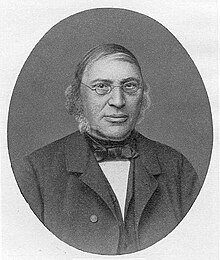Karl Lehrs
German classical scholar
You can help expand this article with text translated from the corresponding article in German. (March 2010) Click [show] for important translation instructions.
- View a machine-translated version of the German article.
- Machine translation, like DeepL or Google Translate, is a useful starting point for translations, but translators must revise errors as necessary and confirm that the translation is accurate, rather than simply copy-pasting machine-translated text into the English Wikipedia.
- Do not translate text that appears unreliable or low-quality. If possible, verify the text with references provided in the foreign-language article.
- You must provide copyright attribution in the edit summary accompanying your translation by providing an interlanguage link to the source of your translation. A model attribution edit summary is
Content in this edit is translated from the existing German Wikipedia article at [[:de:Karl Lehrs]]; see its history for attribution. - You may also add the template
{{Translated|de|Karl Lehrs}}to the talk page. - For more guidance, see Wikipedia:Translation.

Karl Ludwig Lehrs (January 14, 1802 – June 9, 1878), was a German classical scholar.
Born at Königsberg, he was Jewish, but in 1822 he converted to Christianity. In 1845 he was appointed professor of ancient Greek philology at Königsberg University, a post he held until his death.
Work
His most important works are:
- De Aristarchi Studiis Homericis (1833), which laid a new foundation for Homeric exegesis (on the Aristarchean lines of explaining Homer from the text itself) and textual criticism.
- Quaestiones Epicae (1837).
- De Asclepiade Myrleano (1845).
- Herodiani Scripta Tria emendatiora. Accedunt Analecta (1848).[1]
- Populäre Aufsätze aus dem Altertum (1856, Second much enlarged edition, 1875), his best known work.
- Horatius Flaccus (1869), in which, on aesthetic grounds, he rejected many of the odes as spurious.
- Die Pindarscholien (1873).
Lehrs was a man of decided opinions; his enthusiasm for everything Greek caused him to insist on the undivided authorship of the Iliad; comparative mythology and the symbolical interpretation of myths he regarded as a species of sacrilege.
Notes
- ^ The three treatises which are the object of this study are Περὶ μονήρους λέξεως, Περὶ Ἰλιακῆς προσωιδίας, and Περὶ διχρόνων.
References
 This article incorporates text from a publication now in the public domain: Chisholm, Hugh, ed. (1911). "Lehrs, Karl". Encyclopædia Britannica. Vol. 16 (11th ed.). Cambridge University Press. p. 384.
This article incorporates text from a publication now in the public domain: Chisholm, Hugh, ed. (1911). "Lehrs, Karl". Encyclopædia Britannica. Vol. 16 (11th ed.). Cambridge University Press. p. 384.













